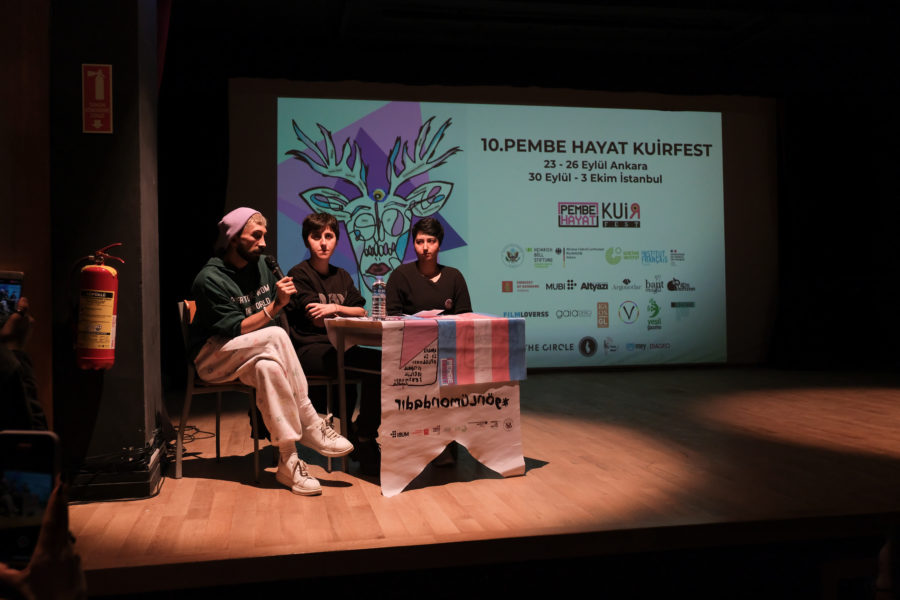
Pink Life LGBTI+ Solidarity Association (Pembe Hayat LGBTİ+ Dayanışma Derneği) received a grant from our Culture & Arts Fund to create a digital platform for queer artists to collaborate on new projects and support each other against difficulties brought by the pandemic.
Read the interview below:
Pink Life LGBTI+ Solidarity Association (Pink Life) provides free counselling in the fields of law, education, health and gender transitioning. Can you tell us about your work in this context?
Our counselling for the LGBTI+ community is intersectional in many respects. In particular, we provide consultancy on legal and health procedures that trans individuals go through during their gender transition processes. In addition, we provide basic information on sexually transmitted diseases and refer applicants to other associations working on this subject. At the same time, we provide support to those affected by practices violating personal data privacy. We provide support for writing petitions regarding gender transitioning, and also for the cases of gender identity amendments in official registration. We also focus on meeting the needs of LGBTI+s within the prison system. In the field of education, we organise programs on LGBTI+ inclusion and provide internship opportunities to psychology and social services students. We also provide thesis counselling to those doing academic work in our field of work.
Our primary goal was to bring together LGBTI+ artists who could not meet, share experiences and support each other due to the pandemic.
You have completed the Queer Artists Solidarity Network project. Can you tell us about the activities of the project?
Our primary goal was to bring together LGBTI+ artists who could not meet, share experiences and support each other due to the pandemic. LGBTI+ community transfers knowledge and culture verbally, since establishing written archives was an activity for privileged groups. The number of channels that will print and publish books or articles has increased over time. During this time, this verbal transfer continued, but the pandemic endangered all safe spaces. We wanted to continue the transfer of knowledge and experience through the Queer Artists Solidarity Network.
With this project, we wanted to create a platform for artists and LGBTI+s who produce content, a space where they can share their experiences and knowledge. This online platform became a safe space where queer artists communicated and talked about their work without censorship. It was possible to find a voice from every field of art in our events where 22 artists joined as participants, writers, and trainers.
When provided with space and opportunity, the artists, who were previously silenced and excluded, were eager to produce even during the pandemic.
With the Queer Artists Solidarity Network project, you enabled queer artists, whose artistic production area has narrowed due to the pandemic, to create new projects. Can you tell us about the project’s impact on queer artists?
Based on the feedback received and the outputs, we can say that the project encouraged artists to produce in different disciplines. When provided with space and opportunity, the artists, who were previously silenced and excluded, were eager to produce even during the pandemic. This was important because it ensured the continuity of art production in these difficult times. Queer Artists Solidarity Network was a project that emerged in the right place at the right time to meet these needs.
How has the grant you received from the Culture and Arts Fund contributed to your association? Do you have a message for the Fund’s donors?
The oppression and bans experienced during and before the pandemic created a difficult period for the LGBTI+ community, and queer art was already struggling with the censorship it experienced. The Culture and Arts Fund provided strong support for Pink Life QueerFest to reach queer artists in need.
The Queer Artists Solidarity Network, created thanks to the Fund, was a crucial step for a minority whose income sources are limited, whose art is censored, and whose voice is blocked, to continue producing art under difficult conditions. The network will continue to open a space of solidarity for artists in the future.
Our primary goal is to ensure that LGBTI+ rights, especially trans rights, are embraced and recognised by the masses in light of changing political agendas.
Can you tell us about the future activities of the Pink Life Association in 2022?
Our primary goal is to ensure that LGBTI+ rights, especially trans rights, are embraced and recognised by the masses in light of changing political agendas. In line with our purpose, we believe in the impact of the virtual world and social media, and we think that it can serve as a tool to break down all forms of prejudice.
Our YouTube channel foresees the production of information and discourse, as well as the continuation of the art festival we organised with QueerFest, and we direct much of our work in this way. In addition, our new projects will include more comprehensive studies, podcasts and training in the field of law.
We saw a highly successful start in developing our Queer Artists Solidarity Network project and will continue to evolve it according to the needs. In addition, we will continue to support LGBTI+ artwork, which we consider significant for social acceptance, via the online film platform.
About Pink Life Association
Pink Life, Turkey’s first trans-rights organisation, implements projects on issues such as social exclusion, discrimination, violence and hate crimes against trans people and provides direct support and consultancy services for legal, educational, health and transition processes. Pink Life also organises the Pink Life KuirFest to discuss queer theory, art and discrimination and violence against LGBTI+s in Turkey.



